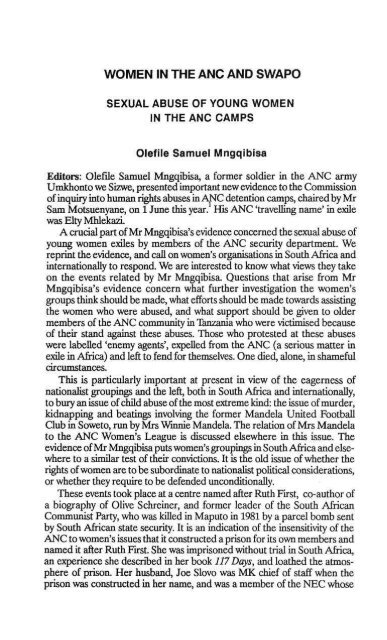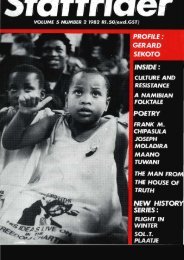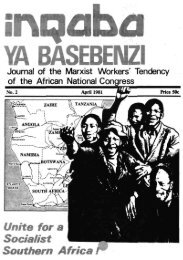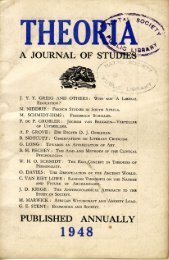You also want an ePaper? Increase the reach of your titles
YUMPU automatically turns print PDFs into web optimized ePapers that Google loves.
<strong>WOMEN</strong> <strong>IN</strong> <strong>THE</strong> <strong>ANC</strong> <strong>AND</strong> <strong>SWAPO</strong><br />
SEXUAL ABUSE OF YOUNG <strong>WOMEN</strong><br />
<strong>IN</strong> <strong>THE</strong> <strong>ANC</strong> CAMPS<br />
Olefile Samuel Mngqibisa<br />
Editors: Olefile Samuel Mngqibisa, a former soldier in the <strong>ANC</strong> army<br />
Umkhonto we Sizwe, presented important new evidence to the Commission<br />
of inquiry into human rights abuses in <strong>ANC</strong> detention camps, chaired by Mr<br />
Sam Motsuenyane, on 1 June this year. His <strong>ANC</strong> 'travelling name' in exile<br />
was Elty Mhlekazi.<br />
A crucial part of Mr Mngqibisa's evidence concerned the sexual abuse of<br />
young women exiles by members of the <strong>ANC</strong> security department. We<br />
reprint the evidence, and call on women's organisations in South Africa and<br />
internationally to respond. We are interested to know what views they take<br />
on the events related by Mr Mngqibisa. Questions that arise from Mr<br />
Mngqibisa's evidence concern what further investigation the women's<br />
groups think should be made, what efforts should be made towards assisting<br />
the women who were abused, and what support should be given to older<br />
members of the <strong>ANC</strong> community in Tanzania who were victimised because<br />
of their stand against these abuses. Those who protested at these abuses<br />
were labelled 'enemy agents', expelled from the <strong>ANC</strong> (a serious matter in<br />
exile in Africa) and left to fend for themselves. One died, alone, in shameful<br />
circumstances.<br />
This is particularly important at present in view of the eagerness of<br />
nationalist groupings and the left, both in South Africa and internationally,<br />
to bury an issue of child abuse of the most extreme kind: the issue of murder,<br />
kidnapping and beatings involving the former Mandela United Football<br />
Club in Soweto, run by Mrs Winnie Mandela. The relation of Mrs Mandela<br />
to the <strong>ANC</strong> Women's League is discussed elsewhere in this issue. The<br />
evidence of Mr Mngqibisa puts women's groupings in South Africa and elsewhere<br />
to a similar test of their convictions. It is the old issue of whether the<br />
rights of women are to be subordinate to nationalist political considerations,<br />
or whether they require to be defended unconditionally.<br />
These events took place at a centre named after Ruth First, co-author of<br />
a biography of Olive Schreiner, and former leader of the South African<br />
Communist Party, who was killed in Maputo in 1981 by a parcel bomb sent<br />
by South African state security. It is an indication of the insensitivity of the<br />
<strong>ANC</strong> to women's issues that it constructed a prison for its own members and<br />
named it after Ruth First. She was imprisoned without trial in South Africa,<br />
an experience she described in her book 117 Days, and loathed the atmosphere<br />
of prison. Her husband, Joe Slovo was MK chief of staff when the<br />
prison was constructed in her name, and was a member of the NEC whose
12 SEARCHLIGHT SOUTH AFRICA, VOL 3, NO 3, OCTOBER 1993<br />
members — Stanley Mabizela and Robert Manci — carried out the repressions.<br />
There is now a definite genre of literature concerning women's struggles<br />
and women's issues that has arisen in South Africa, or which relates to South<br />
Africa. It is associated mainly with the <strong>ANC</strong>. Writers include Hilda<br />
Bernstein, Joyce Sikakane, Julie Frederickse and also Gillian Slovo. The<br />
material printed here should become part of the record.<br />
Sam Mngqibisa's account reveals once again how comprehensively any<br />
kind of democratic accountability was subverted in the <strong>ANC</strong> in exile. Identical<br />
repression of criticism by exiles took place again at Dakawa in 1989, causing<br />
two groups of exiles to flee from Tanzania, and again in 1991, when<br />
Mngqibisa was himself arrested. Further jailings of Zulu-speakers followed<br />
in 1991, including the teacher Bongani Ntshangase, who was murdered in<br />
May 1992 in Natal very shortly after returning to South Africa. 2 A representative<br />
of the British High Commissioner later visited the prison.<br />
In his evidence, Mngqibisa explains that he was sent to the <strong>ANC</strong> camp at<br />
Dakawa in Tanzania in 1984, having previously helped ferry units of MK over<br />
the Zambezi river from Zambia into Botswana and Zimbabwe. The river<br />
was infested with crocodiles and hippopotamus, and this was to test if I was<br />
a loyal <strong>ANC</strong> cadre.' He then relates the story of his experiences at Dakawa,<br />
where he was elected by the exiles to the post of chief of the logistics department<br />
in the camp. His account focuses on the conduct of Imbokodo, the<br />
<strong>ANC</strong> security department. This political police force was then known in Tanzania<br />
under the sweet-smelling name of PRO — the 'Public Relations<br />
Office'.<br />
He describes the attempts of an elected body, the Zonal Political Committee<br />
(ZPC), to protect the young women, who had only recently arrived in<br />
exile.<br />
Making an Offer You Can't Refuse<br />
... I was part of a group which exposed Imbokodo's sexual harassment of<br />
young girls fresh from SA. It was tradition in the <strong>ANC</strong>, especially in Imbokodo,<br />
to sexually abuse young girls and those who were desperately in<br />
need of scholarships. When they refused sexual intercourse with Imbokodo<br />
they were immediately detained and labelled agents of the SA government.<br />
In 1987, ten to fifteen young girls fresh from home approached the Zonal<br />
Political Committee chairman Nhlanhla Masina (his real name), and complained<br />
of sexual harassment by Imbokodo at Plot 18, the Ruth First socalled<br />
Orientation Centre. The ZPC immediately convened a meeting, and<br />
a decision was taken that the girls be clandestinely interviewed and requested<br />
to write on paper their complaints. An elderly ZPC member was<br />
delegated to Ruth First [Centre] and he successfully interviewed the girls and<br />
later brought with him each girl's statement.<br />
The Zonal chief of Imbokodo — Socks — was informed about the<br />
developments. He met his colleagues and afterwards demanded the return
<strong>WOMEN</strong> <strong>IN</strong> <strong>THE</strong> <strong>ANC</strong> <strong>AND</strong> <strong>SWAPO</strong> 13<br />
of the statements from the ZPC chairman. He got a negative response, and<br />
left and came back fuming, demanding the documents now. The ZPC<br />
refused with the documents, which were in safe hands.<br />
This was a serious scandal on the part of Imbokodo. Theoretically, the<br />
ZPC had the right to report anything direcdy to the <strong>ANC</strong> headquarters in<br />
Lusaka through the Regional Political Committee, or RPC [a superior<br />
elected body, representing all the exiles in a region: in this case, Tanzania as<br />
a whole]. The ZPC was said to be the highest body in the zone [Dakawa], the<br />
RPC in the region. But when the RPC wanted to report something to headquarters,<br />
permission was to be sought from Imbokodo. Socks failed to pressurise<br />
the ZPC to hand over the papers and he reported the matter to the<br />
<strong>ANC</strong> chief representative in Tanzania at that time, Stanley Mabizela, and<br />
Robert Manci [a member of the National Executive Committee of the <strong>ANC</strong>,<br />
based in Thnzania]. He is believed to have been a member of the Politburo of<br />
theSACP.<br />
Suddenly an emergency community meeting was announced [on instruction<br />
of the <strong>ANC</strong> leaders, Mabizela and Manci]. Everybody assembled at Plot<br />
16, where the meeting was held. Before the meeting the ZPC was invited to<br />
a private meeting at the Vocational Training Centre in Dakawa by Manci,<br />
Mabizela and Tim Maseko, the then administrator of the Solomon Mahlangu<br />
Freedom College [Somafco, based nearby at Mazimbu]. Four cars consisting<br />
of Dakawa, Dar es Salaam and Mazimbu Imbokodo plus Manci and<br />
Mabizela approached. The scene reflected a typical South African situation,<br />
where the masses are brutally suppressed.<br />
'Provocateurs'<br />
After the singing of Nkosi SikeleP iAfrika (the national anthem), Mabizela<br />
took the floor with a harsh and swearing address. He announced the expulsion<br />
from the <strong>ANC</strong> of three elderly <strong>ANC</strong> members. They were Cecil Nduli,<br />
Jimmy Moore and the late Professor. He accused them of being enemy<br />
provocateurs. Manci followed angrily and endorsed the expulsion, which<br />
was totally in violation of the <strong>ANC</strong> Code of Conduct. Manci bravely said:<br />
'We've removed the upper body of enemy agents'. He pointed a finger at me<br />
and said: 'We are also coming back to you, Elty\ I never bothered about that<br />
threat. There was tension in Dakawa and every <strong>ANC</strong> member was shocked<br />
about the expulsion.<br />
Cecil was an active member of the ZPC and Jimmy was his closest friend.<br />
Professor was an open critic and he also criticised members of the <strong>ANC</strong>-<br />
NEC without fear. The three joined the <strong>ANC</strong> in the 1960s. Jimmy was also<br />
an open critic who was hated by both Manci and Mabizela. I had observer<br />
status in the ZPC to report daily developments and problems in the logistics<br />
department. The ZPC handed the girls' statements to me with the hope that<br />
I was going to box the Imbokodo guys when trying to take the statements<br />
from me by force. [Mngqibisa was then in his early 30s, and is tall and powerfully<br />
built].
14 SEARCHLIGHT SOUTH AFRICA, VOL 3, NO 3, OCTOBER 1993<br />
I helped Jimmy pack his clothes under the watchful eye of Sizwe Mkhonto,<br />
then the regional Imbokodo commander. The brutal action of Manci and<br />
Mabizela was to rub-off [ie, rub out] Imbokodo's sex scandal. Sidwell was<br />
one of the Imbokodo members accused by the girls. The three men who had<br />
been expelled were handed over to the office of the United Nations High<br />
Commissioner for Refugees in Dar es Salaam. Professor developed a mental<br />
disorder and got very sick. I and other <strong>ANC</strong> members tried to locate him in<br />
Dar, but all in vain. We later learned that he died pathetically somewhere in<br />
Dar es Salaam. Manci must account.<br />
The girls' documents were forcefully taken from me by Tim Maseko and<br />
I was kept under more and stronger surveillance, which had prevailed since<br />
1978. 3 1 later resigned from being chief of logistics as relations between me,<br />
Jackie Morake [coordinator at Dakawa] and Manci continued deteriorating.<br />
Some sympathetic comrades always warned me to be careful with critical<br />
politics...<br />
Further Evidence of Abuse<br />
Editors: In his statement, Mngqibisa goes on to describe his work as a<br />
plumber in Dakawa, leading to his arrest and imprisonment in the prison at<br />
Ruth First Centre in January 1991. This and his escape the following<br />
February are described in SSA No 7. Mngqibisa read this passage from SSA<br />
No 7 into his evidence before the commission.<br />
He states that the prison at Ruth First Centre at Dakawa was constructed<br />
out of the girls' dormitories, on the instruction of the Umkhonto commander,<br />
Joe Modise. From many years' acquaintance at first hand, he<br />
describes Modise as the 'architect' of the <strong>ANC</strong> prison system.<br />
Mngqibisa made a serious allegation against another important official in<br />
exile: Andrew Masondo, former national commissar of the <strong>ANC</strong>, who was<br />
later director of the <strong>ANC</strong> school, Somafco, from 1985-89. As director of<br />
Somafco, Masondo was responsible for the education and the welfare of<br />
teenage refugees from South Africa during the latter period of the 1984-86<br />
townships revolt, when education for black children came to a halt inside the<br />
country on the basis of the slogan: 'Liberation before education'. Hundreds<br />
of young people left the country to join the <strong>ANC</strong>, many hoping for scholarships<br />
to study. Donor agencies responsible to the governments of Sweden,<br />
Denmark, Finland, Germany and other countries funded Somafco, which<br />
was the subject of idyllic propaganda in the left and liberal press internationally.<br />
Unesco paid the salaries of its teachers. Yet Masondo and the <strong>ANC</strong><br />
were totally unaccountable. Mngqibisa's statement in evidence continues:<br />
Sexual abuse: Andrew Masondo impregnated a young Somafco<br />
schoolgirl in 1989 and she had to abandon her studies. Masondo<br />
seriously abused human rights in the <strong>ANC</strong>. A majority of <strong>ANC</strong> girls<br />
who studied abroad used tneir bodies to get scholarships.<br />
This statement confirms a remark in a history of the <strong>ANC</strong> in exile in<br />
Searchlight South Africa No 5 by Bandile Ketelo and four colleagues. In their<br />
account, they state that Masondo was 'involved in abuse of his position to
<strong>WOMEN</strong> <strong>IN</strong> <strong>THE</strong> <strong>ANC</strong> <strong>AND</strong> <strong>SWAPO</strong> 15<br />
exploit young and ignorant women and girls\ (p 36) According to them, he<br />
was also a key figure in the running of the <strong>ANC</strong> prison, Quatro, in Angola.<br />
Masondo was cynically appointed director of Somafco by the <strong>ANC</strong> after<br />
being dropped from the NEC and the Central Committee of the SACP in<br />
1985, having been made the scapegoat for the mutiny in Angola. He was then<br />
in his 50s. In Somafco he had the power of a Nicolae Ceaucescu. The ethics<br />
of appointing such a man to such a position over young people seems to have<br />
escaped the <strong>ANC</strong> and the SACP.<br />
Masondo's conduct as director of Somafco urgently requires investigation<br />
by women's organisations, international donor organisations (including<br />
governments) and the South African Democratic Teachers' Union<br />
(SADTU). It involves one of the most sordid episodes in South African<br />
education. But it is unlikely that anything will be done.<br />
In a letter from Tanzania (16 June 1991), Mngqibisa said that two other<br />
<strong>ANC</strong> members were sent to Angola in 1987 as punishment for their criticism<br />
of Imbokodo. One of them was the elderly man who arranged for the girls to<br />
write their statements at Ruth First Centre. The other was a white South<br />
African member of MK, known as Johnson.<br />
The stand taken by Nduli, Moore, Professor (we do not have his real<br />
name), Mngqibisa, 'Johnson' and the elderly man who obtained the girls'<br />
statements took great personal courage. It was one of the most honourable<br />
acts of the exile. Professor, in particular, paid dearly. Imbokodo should be<br />
required to produce the young women's statements, which Maseko illegitimately<br />
seized from Mngqibisa in order to conceal the abuse by Imbokodo<br />
staff. We do not know what became of the young women, who<br />
protested at the abuse to which they were subjected, in the name of the <strong>ANC</strong>,<br />
thousands of miles from the protection of their families. We do not even<br />
know their names.<br />
Some Personal Details<br />
Cecil Nduli (known as 'Baba' or Father Nduli because of his age) and Jimmy<br />
Moore were repatriated to South Africa in 1991, after living in extreme<br />
poverty in Dar es Salaam. They were re-admitted to the <strong>ANC</strong> after Jimmy<br />
Moore approached Walter Sisulu during his visit to Tanzania in 1989.<br />
Robert Manci had been delegated to Tanzania by the NEC in Lusaka to<br />
keep an eye on dissatisfaction among <strong>ANC</strong> members. Mngqibisa has written<br />
to Mr Justice Richard Goldstone giving details of a murder by Imbokodo in<br />
Tanzania in 1987 which was covered up by Manci. Three officials of the<br />
security department — known as Lawrence, Vusi and Stalin — tortured to<br />
death an unknown <strong>ANC</strong> member in Mazimbu camp, Morogoro. They were<br />
arrested on the spot by a Lieutenant Chezi of the Tanzanian People's<br />
Defence Force, who was a government representative in Mazimbu, and were<br />
sentenced to four years' imprisonment by a Thnzanian court. Manci, as a<br />
senior member of the NEC, 'never, ever acknowledged to the <strong>ANC</strong> community<br />
who the deceased was. Under Manci's orders the deceased was
16 SEARCHLIGHT SOUTH AFRICA, VOL 3, NO 3, OCTOBER 1993<br />
buried secretly by unknown people in an unknown place. Manci must tell the<br />
deceased's parents where their son is\ 5<br />
Sizwe Mkhonto (real name Gabriel Mthunzi Mthembu) was commander<br />
of Quatro at the time of the mutiny in Angola. Still in his teens, he called out<br />
the principal leader of the mutiny, Ephraim Nkondo, from his cell at Quatro<br />
on 26 May 1984. Nkondo was seen being pulled around the camp with a rope<br />
around his neck. The next day he was found dead in his cell, with the rope<br />
around his neck. 6 Oliver Tkmbo informed Nkondo's sister-in-law, Mrs Curtis<br />
Nkondo, that Ephraim had 'committed suicide in a cell'. 7 It was almost certainly<br />
murder, not suicide. Sizwe Mkhonto told the Commission that torture<br />
allegations were made by people who aimed to 'besmirch the image of the<br />
movement'. 9 He continues to be employed by Imbokodo at <strong>ANC</strong> headquarters<br />
in Johannesburg. No adequate investigation into Sizwe Mkhonto's<br />
role in the death of Ephraim Nkondo, and in many other atrocities, has taken<br />
place.<br />
Sam Mngqibisa has written a poem about the education of an Imbokodo<br />
officer. It formed part of his evidence.<br />
Give a young boy — 16 years old — from the ghetto of Soweto, an<br />
opportunity to drive a car for the first time in his life.<br />
Tnis boy is from a poor working class family.<br />
Give him money to buy any type of liquor and good, expensive clothes.<br />
This boy left South Africa during the Soweto schools uprising in 1976.<br />
He doesn't know what is an employer.<br />
He never tasted employer-exploitation.<br />
Give him the right to sleep with all these women.<br />
Give him the opportunity to study in Party Schools and well-off<br />
military academies in Eastern Europe.<br />
Teach nim Marxism-Leninism and tell him to defend the revolution<br />
against counter-revolutionaries.<br />
Send him to the Stasi to train him to extract information by force from<br />
enemy agents. He turns to be a torturer and executioner by firing<br />
squad.<br />
All these are the luxuries and the dream-come-true he never thought<br />
of for his lifetime...<br />
This Security becomes the law unto itself.<br />
References<br />
1. Accounts of Mr Mngqibisa's experiences in exile were previously published in Searchlight<br />
South Africa Nos 7 and 8 (July 1991 and January 1992).<br />
2. Searchlight South Africa, Nos 8 and 9,<br />
3. The background to this is given in Mngqibisa's account in SSA No 8.<br />
4. Sisulu had known him in South Africa, decades before.<br />
5. Letter, 23 January 1993.<br />
6. SSA No 10, p 23.<br />
7. Testimony from Joe Nhlanhla, head of the <strong>ANC</strong> Department of Intelligence and Security<br />
— 'Imbokodo' — to the Motsuenyane Commission. Sowetan, 19 May 1993.<br />
8. Sowetan, 9 June 1993.

















